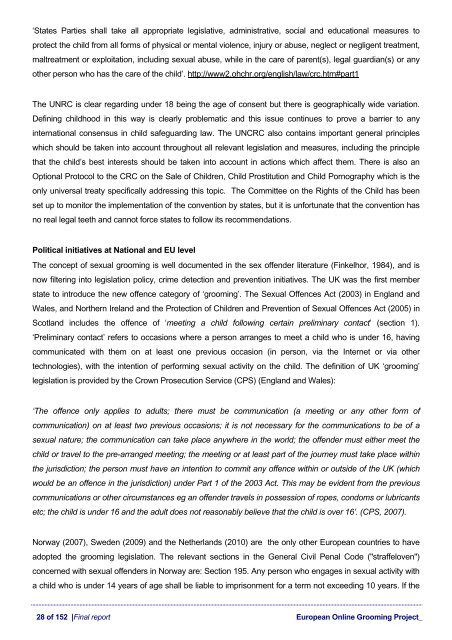Final Report - European Online Grooming Project
Final Report - European Online Grooming Project
Final Report - European Online Grooming Project
Create successful ePaper yourself
Turn your PDF publications into a flip-book with our unique Google optimized e-Paper software.
‘States Parties shall take all appropriate legislative, administrative, social and educational measures to<br />
protect the child from all forms of physical or mental violence, injury or abuse, neglect or negligent treatment,<br />
maltreatment or exploitation, including sexual abuse, while in the care of parent(s), legal guardian(s) or any<br />
other person who has the care of the child’. http://www2.ohchr.org/english/law/crc.htm#part1<br />
The UNRC is clear regarding under 18 being the age of consent but there is geographically wide variation.<br />
Defining childhood in this way is clearly problematic and this issue continues to prove a barrier to any<br />
international consensus in child safeguarding law. The UNCRC also contains important general principles<br />
which should be taken into account throughout all relevant legislation and measures, including the principle<br />
that the child’s best interests should be taken into account in actions which affect them. There is also an<br />
Optional Protocol to the CRC on the Sale of Children, Child Prostitution and Child Pornography which is the<br />
only universal treaty specifically addressing this topic. The Committee on the Rights of the Child has been<br />
set up to monitor the implementation of the convention by states, but it is unfortunate that the convention has<br />
no real legal teeth and cannot force states to follow its recommendations.<br />
Political initiatives at National and EU level<br />
The concept of sexual grooming is well documented in the sex offender literature (Finkelhor, 1984), and is<br />
now filtering into legislation policy, crime detection and prevention initiatives. The UK was the first member<br />
state to introduce the new offence category of ‘grooming’. The Sexual Offences Act (2003) in England and<br />
Wales, and Northern Ireland and the Protection of Children and Prevention of Sexual Offences Act (2005) in<br />
Scotland includes the offence of ‘meeting a child following certain preliminary contact’ (section 1).<br />
‘Preliminary contact’ refers to occasions where a person arranges to meet a child who is under 16, having<br />
communicated with them on at least one previous occasion (in person, via the Internet or via other<br />
technologies), with the intention of performing sexual activity on the child. The definition of UK ‘grooming’<br />
legislation is provided by the Crown Prosecution Service (CPS) (England and Wales):<br />
‘The offence only applies to adults; there must be communication (a meeting or any other form of<br />
communication) on at least two previous occasions; it is not necessary for the communications to be of a<br />
sexual nature; the communication can take place anywhere in the world; the offender must either meet the<br />
child or travel to the pre-arranged meeting; the meeting or at least part of the journey must take place within<br />
the jurisdiction; the person must have an intention to commit any offence within or outside of the UK (which<br />
would be an offence in the jurisdiction) under Part 1 of the 2003 Act. This may be evident from the previous<br />
communications or other circumstances eg an offender travels in possession of ropes, condoms or lubricants<br />
etc; the child is under 16 and the adult does not reasonably believe that the child is over 16’. (CPS, 2007).<br />
Norway (2007), Sweden (2009) and the Netherlands (2010) are the only other <strong>European</strong> countries to have<br />
adopted the grooming legislation. The relevant sections in the General Civil Penal Code ("straffeloven")<br />
concerned with sexual offenders in Norway are: Section 195. Any person who engages in sexual activity with<br />
a child who is under 14 years of age shall be liable to imprisonment for a term not exceeding 10 years. If the<br />
28 of 152 |<strong>Final</strong> report <strong>European</strong> <strong>Online</strong> <strong>Grooming</strong> <strong>Project</strong>_


